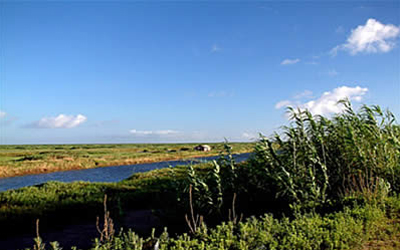Researchers in Shanghai have come up with a plan to weed out a salt-marsh plant that is threatening the ecology of its wetlands, a member of the research team said Thursday.
Smooth cordgrass, also known as Spartina alterniflora, originates from the east and Gulf coasts of the United States. It is used for shoreline protection and tidal marsh restoration because of its complex root system that is able to prevent marshland from eroding.
However, scientists said the rapid expansion of the plant in the Chongming Dongtan Wetland has threatened the ecology of the area.
Introduced in 1995, the plant has grown to occupy more than a quarter of the area. Experts say it is invading tidal flat vegetation and other seashell species, which in turn threatens the survival of waterfowl.
Covering more than 2,500 hectares, Dongtan Wetland is one of the city's major nature reserves and a key resting ground for migratory birds.
Zhang Quanli, a professor at the State Key Laboratory of Estuarine and Coastal Research of East China Normal University, said: "Research has shown the invading cordgrass is the main reason behind the reduced number of waterfowl, and it has severely affected the ecological balance of the wetland."
Conventional means to weed out the invasive plant include burning, submerging and using herbicides, but none has proven to be sufficiently effective against the cordgrass, which reproduces at a startling rate.
Zhang said his team has found a way to cut the grass from above the water surface, before raising the water level to stop the plant breathing.
He said preliminary tests have shown the plant will die after two to three months.
Zhang said the method will be tried out next year.
"Hopefully, the introduction of this new method will help restore the ecological balance of the wetland," he said.
(China Daily December 28, 2007)


